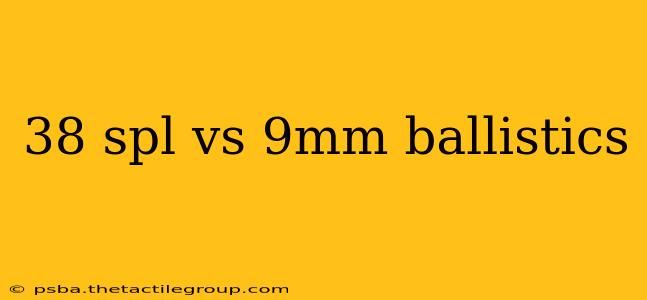Choosing between a .38 Special and a 9mm cartridge often comes down to personal preference and intended use. Both are popular handgun calibers with a long history, but their ballistic characteristics differ significantly, impacting their effectiveness in various situations. This deep dive compares the two, examining their ballistics to help you make an informed decision.
Key Ballistic Differences: .38 Special vs. 9mm
The core difference lies in cartridge design and resulting projectile performance. The .38 Special, a classic revolver cartridge, typically fires heavier bullets at lower velocities than the 9mm, a semi-automatic pistol cartridge. Let's break down the key ballistic parameters:
1. Caliber and Bullet Weight:
- .38 Special: As the name suggests, the .38 Special has a nominal bullet diameter of .357 inches (9.07mm). Common bullet weights range from 125 grains to 158 grains.
- 9mm: The 9mm Parabellum (or 9x19mm) has a nominal bullet diameter of 9mm (.355 inches). Bullet weights commonly range from 115 grains to 147 grains.
While the diameters are very similar, the heavier bullets of the .38 Special generally contribute to greater stopping power, though velocity plays a critical role.
2. Velocity and Energy:
- .38 Special: Velocities typically range from 750 to 1,000 feet per second (fps), depending on the load and barrel length. Muzzle energy falls within the range of 175 to 300 foot-pounds (ft-lbs).
- 9mm: 9mm rounds generally exhibit higher velocities, typically ranging from 1,000 to 1,250 fps, and muzzle energies ranging from 300 to 400 ft-lbs. This higher velocity translates to a flatter trajectory at longer ranges.
The 9mm's higher velocity and energy often result in a more significant impact on the target. However, this advantage diminishes at longer distances due to the 9mm's lighter bullet.
3. Recoil:
- .38 Special: Generally perceived as having manageable recoil, particularly for novice shooters.
- 9mm: Generally produces more felt recoil than the .38 Special due to higher velocity, although advancements in modern 9mm designs and lighter frames have mitigated this difference.
Recoil is subjective and influenced by factors including the shooter's build, firearm weight, and grip.
4. Stopping Power:
This is a complex and hotly debated topic. While the .38 Special's heavier bullets might suggest superior stopping power due to greater energy transfer, the 9mm's higher velocity and better penetration often negate this advantage, especially in heavier bullet weights. The effectiveness of either caliber depends heavily on shot placement.
5. Accuracy and Range:
- .38 Special: Accuracy is generally good at close to medium ranges. The lower velocity leads to a more pronounced bullet drop at longer distances, impacting accuracy.
- 9mm: The 9mm's higher velocity allows for flatter trajectory and greater accuracy at longer ranges than the .38 Special.
Conclusion: Which Caliber is Right for You?
The "better" caliber depends on your priorities and intended use.
-
Choose .38 Special if: You prioritize manageable recoil, a simpler, more robust firearm design (often found in revolvers), and are primarily concerned with close-range self-defense or hunting smaller game. The heavier bullet may provide greater stopping power in certain situations.
-
Choose 9mm if: You prioritize higher velocity, flatter trajectory, greater accuracy at longer ranges, and prefer the features of semi-automatic pistols (larger magazine capacity, faster reloading). The 9mm is commonly preferred for law enforcement and personal defense applications where a higher capacity and flatter trajectory are beneficial.
Ultimately, the best way to determine which caliber suits you is to handle and shoot both. Consult with experienced shooters and firearms professionals to receive personalized advice. Remember that responsible firearm ownership, including proper training and safe handling practices, is paramount regardless of caliber choice.

